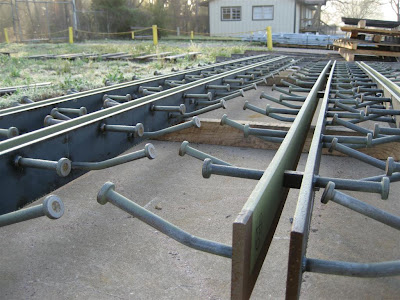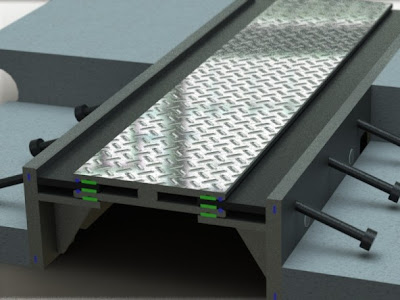Bridge
expansion joint is the joint which is specially designed for curing the thermal
expansions and especially for all the forces producing movement like earthquake
etc. When it’s all about designing a good bridge (providing the expansion joint
also) some of the points must be mainly considered. To know more read the post
ahead including design criteria of bridges and many more things about expansion
joint…….
Introducing the “EXPANSION JOINT”
An
expansion joint is the specifically designed assembly of the structure to
prevent the structure from expansions and contractions of various construction
materials, vibrations and mainly to prevent structure from the movements due to
ground settlements. Another provision to provide the expansion joint is to
connect the various parts of the structure. The expansion joints are mainly
found in the buildings, bridges, railway tracks, ships and other structures.
All
the structures have some variations due to different seasonal variations as
contract or expand as per conditions. If the expansion joints are not provided the
structures will crack or collapse due to stress induces in it.
What is a
Bridge Expansion Joint???
Bridge
expansion joints are designed to allow continues traffic on the bridge
(Reinforced, prestressed concrete, composite and steel structures) preventing
from movements of bridge as well as the movements due to ground settlements.
The Expansion joint prevents bridge from bending in case of extreme loading.
Bridge expansion joint also allows required vertical movements without any hazardous
effects on bridge. Every one of us had experienced this vertical movement while
the vehicle passes over the expansion joint of the bridge.
The other major benefit of expansion joint is
that in case if the structure collapses in any condition, the portion between
two expansion joints will be damaged only and can be repaired without dismantling
the whole structure.
Construction
of Bridge Expansion Joint
While
matter of discussion is the construction of expansion joint, some of questions arise.
As how they resist? Or how each of part of bridge is connected to each other?
Or how these joints are constructed?
As
all we know that the joints are provided on the columns or piers provided. On the
face of the joint a steel plate (Strip Seal) is provided which is connected to
the reinforcement of the bridge with a joining assembly. This steel plate (strip
seal) protects the faces of bridge portions from breaking as well as strengthens
the outer edge against cracking. The joints so provided are of different types
which allow movement from 30 to 1000 mm.
While
strip seal is connected properly to the reinforcing bars of bridge, then next
step is about grouting the seal. GROUTING of the expansion joint is done when
installation of the joint is completed in accordance to the specifications
provided by engineer. The area surrounding expansion joint must be free from
dirt, dust or other harmful particles. Cleaning of the joint may be done by
using compressed air or water jet. The area where expansion joint is provided
is named as substrate. The substrate must be pre-damped before process of
grouting but on the same time make sure that there must not be standing water
on the surface where grouting is to be done.
In
case if grouting is done in layers a broom must be used for making the surface
rough so that different layer will be attached to each other.
At
the end conclusion is to increase the usage of expansion joint in bridges as
well as buildings. The forces, loading, and earth movements which cause damage to
the structures will just totally resolved and if damage causes in any superior
conditions it will take place in any specified portion not in whole structure. This
will be repaired easily without demolishing the structure.
For
your feedback and any addition to above article please feel free to share your
comments below. For further technology related articles keep in touch and keep
reading.
for your feedback and suggestions you may also like and suggest us on our facebook page
>>
https://www.facebook.com/Dezigntheworld
just like n share to be in touch
.jpg)
.jpg)


.jpg)




No comments:
Post a Comment